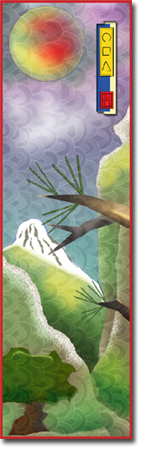On The Way: The Daily Zen Journal
The Wise Ones of Old
Lao Tzu
The Wise Ones of Old
The wise ones of old had subtle wisdom
And depth of understanding,
So profound that they could not be understood.
Because they could not be understood,
I can only describe how they appeared in the world:
Cautious, like crossing a wintry stream,
Watchful, like one facing danger on every side,
Ceremonious, as one who pays a visit;
Yielding, like ice beginning to melt,
Genuine, like a piece of uncarved wood,
Open-minded, like a valley,
And mixing freely, like murky water.
Which of you can assume such murkiness,
To become in the end still and clear:
Which of you can make yourself still,
To become in the end full of life?
Those who possess this Tao do not try to
Fill themselves to the brim,
And because they do not try to
Fill themselves to the brim
They are like a garment that endures
All wear and need never be renewed.
— Lao Tzu 
Combined translations from The Wisdom of Lao Tzu by Lin Yutang (1948) and The Way and Its Power by Arthur Waley (1958)
The Height of Heaven, the Thickness of Earth
The body of heaven is extremely high. Open, round, immeasurable, it is boundlessly vast. Covering everything, containing everything, it produces myriad beings without presuming on its virtue, it bestows blessings on myriad beings without expectation of reward. Whether people are respectful or insincere, supportive or antagonistic, is left up to them. Whether people are good or bad, attractive or repulsive, and whether creatures are violent and stubborn or docile and obedient, they are allowed to be so of themselves, without any contrivance.
The earth is very thick. Lowly, below all else, it bears everything and nurtures all beings. It can bear even the weight of the great mountains, and it can endure even the erosive force of great waters. It tolerates being pierced by plants and trees, and it submits to the tread of bird and beasts.
I realize through this observation the Tao of emulating heaven and earth. If people can be open-minded and magnanimous, be receptive to all, take pity on the old and poor, assist those in peril and rescue those in trouble, give of themselves without seeking reward, never bear grudges, look upon others and self impartially, and realize all as one, then people can be companions of heaven.
If people can be flexible and yielding, humble, with self-control, entirely free of agitation, cleared of all volatility, not angered by criticism, ignoring insult, docilely accepting hardships, illnesses, and natural disasters, utterly without anxiety or resentment when faced with danger or adversity, then people can be companions of earth.
With the nobility of heaven and the humility of earth, one can merge with the attributes of heaven and earth and extends to eternity with them.
– From Awakening to the Tao by Lui I-Ming; translated by Thomas Cleary (1988)




The beauty of Taoism is the blending of nature so effortlessly into the voice of the Way. Rather than relying on ideas or dogma about right actions, we develop our ability to observe, absorb, and then to reflect back the depths of the natural world around us. We return to the place before opinions, values, and ideas; then act from that still, calm center in a way like the wise ones of old.
A Life of Flow; one of the most beautiful things and one of the rarest. A human life like a mountain stream. It's easy to talk about flowing with the big Changer and about harmony, but the truth is, it's easy to get stuck in a pattern where we expect things to conform to us too much.
To be ready, poised; to sit as though ready to stand; to move as if ready to change direction. To turn off the automatic pilot, open your eyes and to be alive.
Moving lightly and easily with life while remaining deep and silent inwardly is to live a life of Flow. It's the natural way to go, the mountain stream way of doing things, and it's really practice in action.
— Maverick Sutras
Pressing gently forward,
Elana, Scribe for Daily Zen